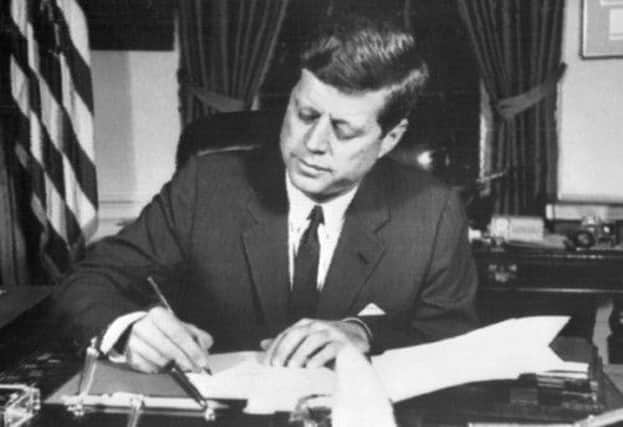George Kerevan: JFK inspired a generation to cynicism


FIFTY years ago next month – on Friday 22 November 1963, to be exact – President John F Kennedy was assassinated in Dallas, Texas.
For my generation of baby boomers, JFK’s death was a defining moment. It was the first major human drama to be played out on television.
Advertisement
Hide AdAdvertisement
Hide AdWe saw Jackie in her blood-spattered suit. We saw Lee Harvey Oswald literally shot down in front of the cameras in the Dallas police headquarters by Jack Ruby. This was politics made peculiarly personal for every viewer, regardless of nationality or language. And coming only 12 months after Kennedy and Khrushchev had taken the world to the brink of nuclear holocaust over Cuba, the assassination underlined the extreme fragility of human society. In other words, it scared the living daylights out of everyone in reach of a television set.
The planes crashing into the Twin Towers in 2001 riveted the attention of today’s global village. But few of us knew anyone who died that day in New York. Nor was there any sense that the world would end. So we watched the collapse of the World Trade Centre as passive spectators rather than active participants.
Back in 1963 the mood was different. We felt that someone we knew personally had just been murdered – Jack Kennedy, helped by his handsome looks and Irish charm, was the first politician to cultivate a television following. As a result, the assassination ushered in the age of youth revolt and a Freudian anger at the world our parents had made. Kennedy’s pointless death also sanctioned our desire to live for the moment – a selfish hedonism that baby boomers have maintained into our retirement years.
At the time of Kennedy’s death, it was almost 50 years since the assassination of Archduke Ferdinand, the event that triggered the First World War. To a teenage George Kerevan in 1963, the murder of the archduke was ancient history indeed – back with Noah’s Flood. Yet to the Kerevan of 2003, Kennedy’s murder seems like yesterday. Which means that for today’s young folk, John Fitzgerald Kennedy is not the vibrant personality of my memory but an obscure American politician who was shot sometime in the prehistoric age before mobile phones, Twitter, or even (yikes!) colour television.
So does the assassination of JFK signify anything today? One prominent theory that will be aired during the 50th anniversary is that Kennedy’s death meant the loss of a leader who would have stopped the Vietnam War and whose liberal charisma would have prevented America from tearing itself apart during the 1960s. This is unadulterated fantasy. The sad truth is that John Fitzgerald Kennedy turned out a fraud. He was a liar to the electorate and the media. He was a compulsive womaniser who used his position to de-flower young female assistants, while using his family as a political prop. In fact, Jack Kennedy is the archetype of the mendacious spin-meisters of the television era that have made today’s younger generation completely cynical about politics and politicians.
Leave aside how JFK invented a non-existent “missile gap” with the Soviet Union to discredit the gentlemanly President Eisenhower and exploit rabid anti-Communism during the 1960 presidential election. Leave aside how the Democrats “won” that election through a combination of stuffing ballot boxes and denying millions of black Americans a vote. Cut to the chase: would Kennedy have avoided Americanising the Vietnam War?
Kennedy fans refer to his statement (just before the assassination) eschewing sending American troops to South Vietnam. They argue that the Vietnam War should be blamed on JFK’s accidental successor, the earthy Lyndon Johnson, who retained most of JFK’s hawkish national security team.
Kennedy admirers also use the “benign” outcome of the Cuban crisis to claim Kennedy was a peace dove. In fact, the year after Cuba, JFK sanctioned a tripling of the US missile fleet, to enhance his re-election chances and to maintain political superiority over the chastened Soviets. The Kremlin bureaucrats responded to Kennedy’s new throw of the dice by dumping Khrushchev and launching their own massive military expansion. Thus did Kennedy’s personal diplomacy ignite a new arms race.
Advertisement
Hide AdAdvertisement
Hide AdWhat of Kennedy’s seeming reluctance to Americanise the Vietnam conflict? That had everything to do with the upcoming 1964 presidential election. Had Kennedy won a second term, all bets would have been off. He had already sent 16,000 military “advisors” into South Vietnam and connived in the military coup that ousted President Diem in early November 1963 – Diem’s brother and confidants were hostile to greater US influence in the country. Kennedy also sanctioned massive CIA-led guerrilla attacks in Laos and North Vietnam. Kennedy would have been the prisoner of events just as much as Johnson.
By 1964, Kennedy would also have been under huge domestic pressure. Reporters were about to expose his affair with Ellen Rometsch, a former member of the East German Communist Party. Vietnam might have proved a useful diversionary tactic. Instead, fortunately for the Kennedy legacy, his motorcade entered Dealey Plaza, and eternity.
In retrospect, JFK is far less important than the man propelled into the White House by his death. Lyndon Johnson was financially corrupt. But he was also a committed social democrat who passed the first effective civil rights legislation and America’s first basic health insurance system. Had Johnson not been engulfed by the Vietnamese conflict Kennedy bequeathed him, he would be remembered as one of the greatest American presidents of the 20th century.
My generation does owe JFK (or his speechwriters) a few debts. He did inspire the feeling that political change was possible. It is an idea my generation has never lost. Sadly, Kennedy’s longer-term legacy was to generate cynicism about the effectiveness of democratic politics.